Unit 2 Reading:The Olympic Games教案设计
Unit-2-The-Olympic-Games教案
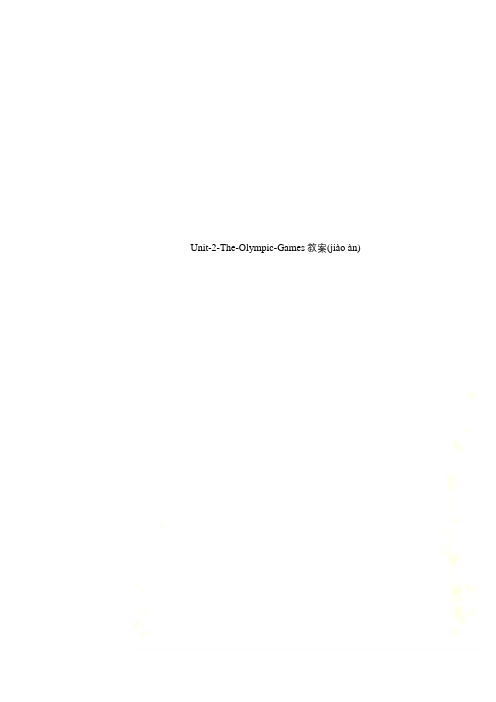
Unit-2-The-Olympic-Games教案(jiào àn)Unit-2-The-Olympic-Games教案(jiào àn)Unit 2 The Olympic GamesI.教学内容分析(fēnxī)本单元的中心(zhōngxīn)话题是“奥运会”。
Warming Up部分通过讨论让学生了解古代和现代(xiàndài)奥运会的异同。
Pre-reading部分的三个问题则进一步考查学生(xué sheng)对奥运会基本常识的了解。
Reading部分作者通过一个虚拟(xūnǐ)的采访向读者介绍了古代奥运会与现代奥运会的异同。
Comprehending部分帮助学生归纳他们已知的和刚学到的关于古代与现代奥运会异同,并且进一步讨论奥运会相关知识。
Learning about Language部分都同单元主题紧密相关,词汇和语法结构的呈现也尽可能地安排在相关的语境中。
Using Language部分通过一个希腊神话故事来引导学生进行读、听、说、写的综合训练。
Learning Tip部分鼓励学生在两人活动和小组活动中积极发言(fā yán),这样既可以消除害羞的心理,又有利于学生掌握恰当的交际策略。
II.教学重点(zhòngdiǎn)和难点1.教学(jiāo xué)重点(zhòngdiǎn)(1) 本单元的生词(shēngcí)和短语;(2)学会使用将来时的被动语态;(3)让学生熟悉奥运会—世界上最重要的体育盛会;能用英语就奥运会的基本知识进行互相问答,并能简述奥运会的基本知识;(4)鼓励学生表达自己的兴趣爱好,要多让学生讲自己熟悉的话题。
2.教学难点(1) 指导学生按类别归纳整理词汇,让学生学会有效的记忆词汇的方法;(2) 引导学生发现本单元重点语言结构,让学生自己发现并感悟相关的语言规律,培养他们的语感。
英语Unit2 The Olympic Games教学设计
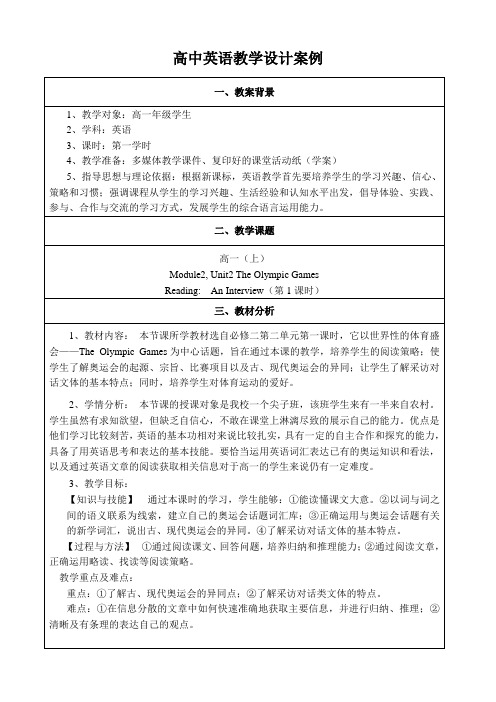
IW 7' CW 1'
第二次阅读:通过个体阅读、回 答问题,训练学生捕捉关键信息 的能力;通过回答问题,培养学 生的归纳和推断能力。让学生进 一步了解课文内容。
IW 5' GW 2'
1. Ss find the differences and the similarities between ancient Olympics and modern Olympics.
教学活动 Activities
设计意图 Intentions
互动模式 &时间
IP & time
(Preparation) Warming up and Pre-reading
1. A quiz: Ss discusquestions about the Olympic Games. 曲导入。
二、教学课题
高一(上) Module2, Unit2 The Olympic Games Reading: An Interview(第 1 课时)
三、教材分析
1、教材内容: 本节课所学教材选自必修二第二单元第一课时,它以世界性的体育盛 会——The Olympic Games 为中心话题,旨在通过本课的教学,培养学生的阅读策略;使 学生了解奥运会的起源、宗旨、比赛项目以及古、现代奥运会的异同;让学生了解采访对 话文体的基本特点;同时,培养学生对体育运据图片建立奥运会 主题词汇库;帮助学生复习已有
GW 2'
3. Ss talk about the difference between ancient and modern Olympic Games.
词汇,训练逻辑思维,让学生有 效识记并使用新学词汇,为后续 的学习做好铺垫。
人教版高中英语必修2《Unit 2 The Olympic Games》

人教版高中英语必修2《Unit 2 The Olympic Games》人教版高中英语必修2《Unit 2 The Olympic Games》教案【一】教学目标Goal For Knowledge1. Get the students to learn the useful new words and expressions in bold in this part: ancient, pete, medal, volunteer, Greece, homeland, regular, basis, athlete, admit, slave, nowadays, gymnastics, stadium, gymnasium, host, responsibility, replace, swift, motto, take part in, stand f or, as well2. Let students learn about the basic knowledge on the Olympic Games. Goal For Ability1. Develop the students reading ability and let them learn different reading skills.2. Enable the students to learn to talk about the Olympic Games. Goal On Emotion1. Arouse the students great interest in the Olympic Games.2. Develop the students sense of cooperative learning.教学重难点Key Points about the Class1. Let the students learn more about the basic knowledge on the Olympic Games.2. Get the students to learn different reading skills.Difficult Points about the Class1. Develop the stu dents reading ability.2, Enable the students to learn to tal k about the Olympic Games.3. Let the students learn to use paring and contrasting when writing.教学过程Process of the ClassStep 1 lead in1. IntroductionAs we know, the ancient Olympic Games took place in Olympia in Greece every four years between 776BC and 339BC. Only men and boys could pete in the ancient Olympic Games. Married women were not even allowed to watch the Games; only young girls, boys and men could watch.However, in modern times, there are two main sets of Gamesthe Summer and Winter Olympics, and both are held every four years. Athletes from any country who have reached the agreed standard for their event will be admitted as petitors. Therefore, there are many significant differences between the modern and ancient Olympics, although certain similarities exist.In this text, Pausanias, an ancient Greek writer, has e on a magical journey to find out more about the ancient and modern Olympics. Has he got what he wants to know? I think you have got the answer. OK. First, lets do a survey about Olympics.Reflection:This part is to introduce the students to the text briefly to make the text easy for them to read.6. How many main kinds of the Olympic Games are there in the world?7. What is the motto of the Olympic Games?8. What is the host city of the first Olympics?9. What is the host city of the 202X Olympics?10. What is the host city of the 202X Olympics?Suggested keys:1-5 CBCDC6. Two. They are the Summer Olympic Games and the Winter Olympic Games.7. Higher, swifter and stronger.8. Athens, Greece.9. Athens, Greece.10. Beijing, China.Reflection:This part is to arouse the interests of the students on Olympic Games and get them into the reading slowly.Step 2 Pre-readingAsk the students to look at the title of the text and the pictures in it and talk about them.1) TitleAn InterviewAn interview is a meeting in which someone is asking another one some questions in order to find out about their actions or opinions.2) The first picture in the textThe first picture is the statue of a great Greek. His name is Pausanias. He was a famous traveler and writer in the second century AD.3) The second picture in the textThe second picture is a Chinese athlete named Yang Yang. She won a gold medal for China at the 202X Winter Olympic Games. She is a famous skating player.4) The third picture in the textThe third picture is the opening ceremony of the Olympic Games. Maybe this is the main stadium. Its large and can hold thousands of audience. See in the sky the five white rings? They are the Olympic Five Rings which stand for the five continentsAsia, Africa, the Americas, Europe and Oceania.Reflection:This step is to help the students make a further understanding of the text.Step 3 Readingprehending1 . Reading for the main ideaWhat does the passage mainly tell about?Suggested answer:This text mainly tells about the similarities and the differences between the ancient and modern Olympic Games.2. Reading for detailed informationAsk the students to read this text carefully to locate detailed information and then choose the best answer.1) Where do all the petitors live?A. A hotel.B. A special village.C. A restaurant.D. A place hired by petitors.2) Why do many countries want to host the Olympic Games?A. To run faster, jumper higher and throw further.B. To get a great honour.C. To make the country famous.D. To make money.3) Which of the following is included in the Winter Olympic Games?A. Skiing and ice skating.B. Running races.C. Horse riding.D. Swimming.4) The last Olympic Games were held in _________.A. BeijingB. AtlantaC. AthensD. Sydney5) Why does Pausanias think people may be peting for money in the modern Olympic Games?A. Because the winner can get medals.B. Because the winner can be awarded lots of money by their own countries.C. Because the olive wreaths have been replaced by medals.D. Because medals are made of gold.Suggested answers: 1)–5) BBACCReflection:This part is to check if the students have truly understood the text.3. Read the passage carefully and answer the following questions.1) What amazes Pausanias about the Olympic Games?2) Why does he think Athens and Beijing should feel proud?Keys:1) Pausanias is amazed that many countries take part in the Olympics and women too and there are two sets of Olympics.2) Its a great honour to host the Olympics.Reflection:This part is to enable the students to have a deep understanding of the text by answering some difficult questions.Keys:1. one2. women; slaves3. Greece4. two5. reached; agreed standard6. anywhere in the worldReflection:This part is to strengthen the key content in the text.5. Summary writing 归纳写作Answer these questions in not more than 100 words.回答下列问题,将答案组成一个段落,不要超过100个单词。
【教学设计】英语Unit2TheOlympicGames精品教案

Unit 2 The Olympic GamesTeaching aims:1.Let students learn about the basic knowledge on the Olympic Games.2.Develop students’reading ability and let them learn different readingskills.3.Enable students to learn to talk about the Olympic Games.4.Arouse students’ great interest in the Olympic Games.Teaching important points:1.Let students learn more about the basic knowledge on the OlympicGames.2.Get students to learn different reading skills.Teaching difficult points:1.Develop students’ reading ability.2.Enable students to learn to talk about the Olympic Games.Teaching methods:1.Task-based teaching and learning2.Cooperative learning3.DiscussionTeaching aids: The multimediaTeaching procedures:I.GreetingsII.Lead-in1. Show a video of Beijing 20** Olympic mascots to lead in the topic.2. Do a competition about the knowledge of the Olympic Games.III.ReadingStep 1 Fast readingListen to the tape and answer the following questions.1. Who talked in the interview? What are they?2. Why does the man think the girl must be proud?Step 2 Detailed readingRead the passage quickly and choose the best answer to each question according to the text.1. Why did Pausanias come to our time?A. Because he wanted to be a volunteer.B. Because he wanted to learn something about the modern Olympic Games.C. Because he wanted to write a book about the modern Olympic Games.D. Because he wanted to interview a Chinese athlete.2. Why do many countries want to host the Olympic Games?A.To run faster, jump higher and throw furtherB.To get a great honorC.To make the country famousD.To make money3. Where do all the competitors live?A.A hotelB. A special villageC. A restaurantD. A place hired by competitors4. The last Olympic Games were held in________.A. BeijingB. AtlantaC. AthensD. Sydney5. How did Pausanias feel when he learned that all countries could take part in the modern Olympic Games?A.SurprisedB. ExcitedC. ProudD. UpsetStep 3 SkimmingStep 4 SummaryPlease complete the passage with proper words.The Olympic Games are the biggest sports meeting in the world. There are two_____of Olympic Games. One is the summer Olympics, the other is the Winter Olympics. Both of them are held every four years. All countries can take part if their athletes reach the _________ to be _______to the games. Women are not only allowed to join in but playan ________role. A special village is built for the_________ to live in, a main ________ building, several stadiums for competitions, a gymnasium as well. It’s a great __________ but also a great honour to host the Olympics. It’s just as much a competition to host the Olympics as to win Olympic_______. The olive wreath has been ________ by medals. But it’s still about being able to run faster, jump_______ and throw_________.IV. Post-reading1. DiscussionIs being the host of the Olympic Games good or bad?2. Enjoy a songⅤ. HomeworkSurf the Internet to find more information about Olympic Games. You are expected to share it with your classmates in the next class.Unit 2 The Olympic Games教学设计授课教师:黄少冰。
高中英语教学设计unit2_The_Olympic_Games
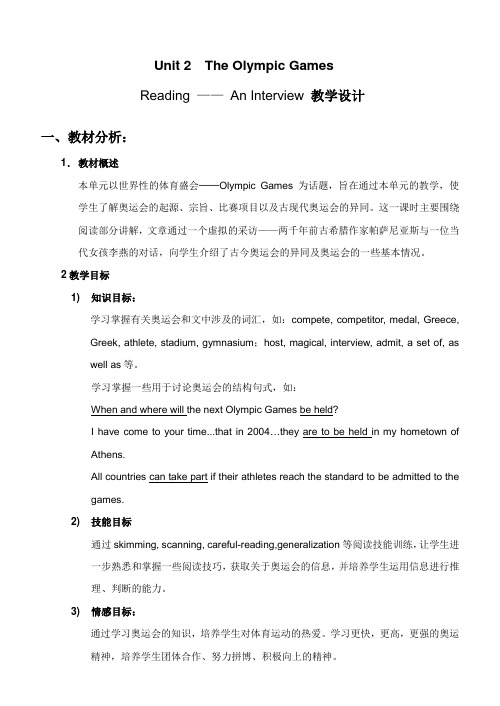
Unit 2 The Olympic GamesReading ——An Interview 教学设计一、教材分析:1.教材概述本单元以世界性的体育盛会──Olympic Games 为话题,旨在通过本单元的教学,使学生了解奥运会的起源、宗旨、比赛项目以及古现代奥运会的异同。
这一课时主要围绕阅读部分讲解,文章通过一个虚拟的采访——两千年前古希腊作家帕萨尼亚斯与一位当代女孩李燕的对话,向学生介绍了古今奥运会的异同及奥运会的一些基本情况。
2教学目标1) 知识目标:学习掌握有关奥运会和文中涉及的词汇,如:compete, competitor, medal, Greece,Greek, athlete, stadium, gymnasium;host, magical, interview, admit, a set of, aswell as等。
学习掌握一些用于讨论奥运会的结构句式,如:When and where will the next Olympic Games be held?I have come to your time...that in 2004…they are to be held in my hometown ofAthens.All countries can take part if their athletes reach the standard to be admitted to thegames.2) 技能目标通过skimming, scanning, careful-reading,generalization等阅读技能训练,让学生进一步熟悉和掌握一些阅读技巧,获取关于奥运会的信息,并培养学生运用信息进行推理、判断的能力。
3) 情感目标:通过学习奥运会的知识,培养学生对体育运动的热爱。
学习更快,更高,更强的奥运精神,培养学生团体合作、努力拼博、积极向上的精神。
3.教学重点本课的教学重点是帮助学生了解古、今奥运会的异同点和其一些基本情况。
人教版高中英语必修二Unit 2 the olympic games Reading教学设计
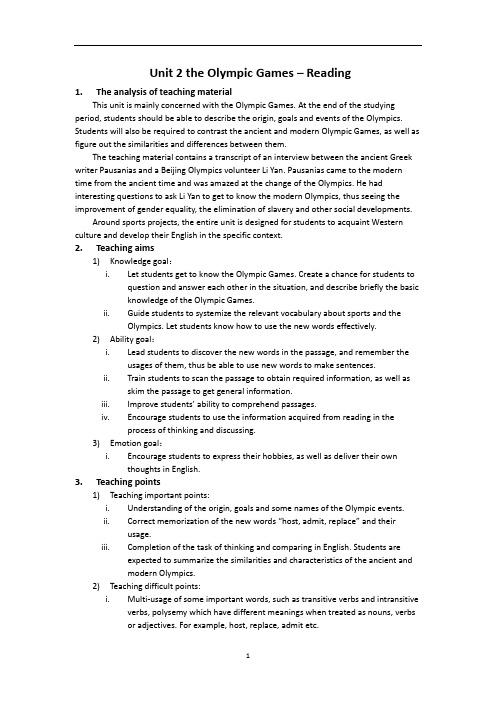
Unit 2 the Olympic Games – Reading1.The analysis of teaching materialThis unit is mainly concerned with the Olympic Games. At the end of the studying period, students should be able to describe the origin, goals and events of the Olympics. Students will also be required to contrast the ancient and modern Olympic Games, as well as figure out the similarities and differences between them.The teaching material contains a transcript of an interview between the ancient Greek writer Pausanias and a Beijing Olympics volunteer Li Yan. Pausanias came to the modern time from the ancient time and was amazed at the change of the Olympics. He had interesting questions to ask Li Yan to get to know the modern Olympics, thus seeing the improvement of gender equality, the elimination of slavery and other social developments.Around sports projects, the entire unit is designed for students to acquaint Western culture and develop their English in the specific context.2.Teaching aims1)Knowledge goal:i.Let students get to know the Olympic Games. Create a chance for students toquestion and answer each other in the situation, and describe briefly the basicknowledge of the Olympic Games.ii.Guide students to systemize the relevant vocabulary about sports and the Olympics. Let students know how to use the new words effectively.2)Ability goal:i.Lead students to discover the new words in the passage, and remember theusages of them, thus be able to use new words to make sentences.ii.Train students to scan the passage to obtain required information, as well as skim the passage to get general information.iii.Improve students’ ability to comprehend passages.iv.Encourage students to use the information acquired from reading in the process of thinking and discussing.3)Emotion goal:i.Encourage students to express their hobbies, as well as deliver their ownthoughts in English.3.Teaching points1)Teaching important points:i.Understanding of the origin, goals and some names of the Olympic events.ii.Correct memorization of the new words “host, admit, replace” and their usage.pletion of the task of thinking and comparing in English. Students are expected to summarize the similarities and characteristics of the ancient andmodern Olympics.2)Teaching difficult points:i.Multi-usage of some important words, such as transitive verbs and intransitiveverbs, polysemy which have different meanings when treated as nouns, verbsor adjectives. For example, host, replace, admit etc.4. Teaching methods and procedures1) Teaching methodsi. Readinga) Make students master reading skills such quickly looking at the entirepassage to get a thorough understanding (skimming), finding detailedinformation (scanning) and generalizing the main idea of a passage(summarizing).b) Try to use simpler English to explain new words to create anEnglish-speaking background.c) Ask student to play the roles of the interviewer and interviewee toreplicate the scene, thus increase their interests in and adaptability ofEnglish.d) Utilize mind map to help students express thoughts in English.ii. Language pointsa) Repeat newly learned words in class as many times as possible forstudents to make a deeper impression of the pronunciations and usagesof the new words.b) Create opportunity for students to make sentences and encourage themto master usages of the key words and expressions.c) Depending on their English level, students can start from using the keywords in Chinese to make sentences, and then ask help from theclassmates and teachers to translate sentences into English.2) Teaching proceduresi. Greeting (1 min )a) Good morning everyone! Glad to meet you.ii. Reviewing (3 mins )a) Review the newly learned words from the former period.iii. Warming-up (2 mins )a) Show pictures of the Olympic architecture, torch, mascots and medals,and ask students what the pictures are for.b) Display a photo of a summary of different Olympic sport events and readout the English names of the events.c) Advocate the motto of the Olympic Games –“swifter, higher andstronger”.iv.Fast reading (2 mins ) a) Ask students the following questions. 1) Do you know any differences between the ancient and modern Olympic Games? List two of them. 2) When and where will the next Olympic Games be held? 3) Look at the title and the pictures and predict the content. Then read it quickly and see if you were right. b) Give students three minutes to read the passage quickly to get a general idea out of it. v. Careful reading (7 mins)a) Scan the passage to fill in the following blanks. Each group is responsiblefor completing one question. Groups who have accomplished the task willget one point.Games Olympic GamesEvents Fewer 4.________Athletes Only men from 5.______ citiesAthletes from 6._____ theworld can take part in,including 7.____________Places Greece 8.____________________Prize 9.___________________ 10.___________________b)Complete Task 1 of the Comprehending section after scanning thepassage. Find out the characteristics and similarities of the ancient andmodern Olympics.c) Complete Task 2 on the textbook after reading the passage carefully. Askstudents the following questions:1)What amazes Pausanias about the Olympic Games?Answer: All the countries as well as woman can take part in the Olympics, and there are many more sports events.2)Why does he think Athens and Beijing should feel proud?Answer: Because Athens hosted the 2004 Olympic Games, and Beijing hosted the 2008 Olympic Games.3)Why does he think people may be competing for money in themodern Olympic Games?Answer: He thinks that so many things about the Olympics have changed that he fears that spirit of the Olympics may have changedtoo.vi.Brain-storming (3 mins)a)Brainstorm in groups the reasons to host and not to host the OlympicGames. Complete Task 3 on Page 11 of the textbook. Each team will getone point for coming up with one reason.vii.Explaining (9 mins)a)Host:To organize a party or hold an event;Eg. The 2016 Olympic Games will be hosted in Rio.To make friends happy;Eg. Can you host my friends while I’m away?The person who invites friends to a party or an event;Eg. Yesterday we were hosts to a few friends.b)Admit:To allow somebody to become a member of a team;Eg. She was admitted to Beijing University last summer.To express something to be true;Eg. She admitted her crime.Eg. He admitted having broken the window.c)Replace: to be used instead of somebody/something else;Eg. Every year we replace our text books with new ones.viii.Practicing (5 mins)a)Complete the following practice to consolidate students’ knowledge ofthe new words. Retell what students learned from the interview. Groupswill get one point for filling one blank.ix.Role-playing (3 mins)a)Have student volunteers play the role of the interviewer and theinterviewee to further comprehend the meaning of this passage.x.Summarizing (3 mins)a)Review all the newly learned words again and what is on the blackboard.b)Add up the points of each group and send out small presents to thewinning teams.c)Address the principle of “Friendship before competitions”.xi.Homework (1 min)a)Entire class – complete the following practice.b)Volunteers – work in groups to search for new information about the 2016Olympic Games, including its date, location, events, candidates, openingceremony and closing ceremony, make it a poster and present in class.c)preview the story of Atalanta5.Blackboard Design。
高中英语:Unit 2 The Olympic Games-reading教案 新人教版必修2
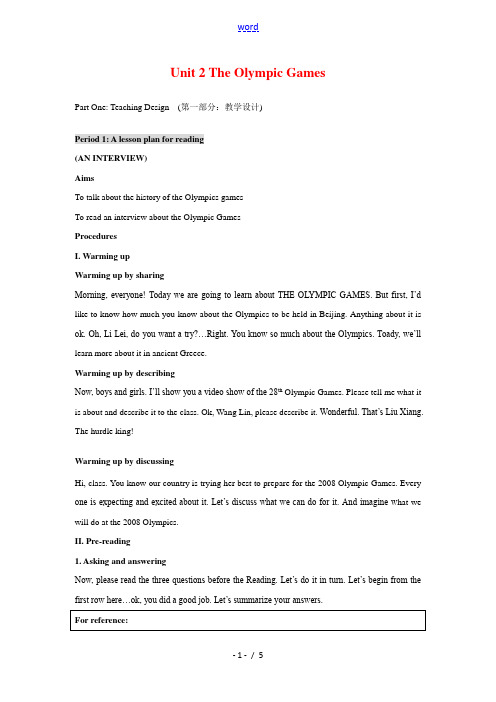
Unit 2 The Olympic GamesPart One: Teaching Design (第一部分:教学设计)Period 1: A lesson plan for reading(AN INTERVIEW)AimsTo talk about the history of the Olympics gamesTo read an interview about the Olympic GamesProceduresI. Warming upWarming up by sharingMorning, everyone! Today we are going to learn about THE OL YMPIC GAMES. But first, I’d like to know how much you know about the Olympics to be held in Beijing. Anything about it is ok. Oh, Li Lei, do you want a try?…Right. You know so much about the Olympics. Toady, we’ll learn more about it in ancient Greece.Warming up by describingNow, boys and girls. I’ll show you a video show of the 28th Olympic Games. Please tell me what it is about and describe it to the class. Ok, Wang Lin, please describe it. Wonderful. That’s Liu Xiang. The hurdle king!Warming up by discussingHi, class. You know our country is trying her best to prepare for the 2008 Olympic Games. Every one is expecting and excited about it. Let’s discuss what we can do for it. And imagine w hat we will do at the 2008 Olympics.II. Pre-reading1. Asking and answeringNow, please read the three questions before the Reading. Let’s do it in turn. Let’s begin from the first row here…ok, you did a good job. Let’s summarize your answers.2. Imaging and introducingPlease look at the three pictures in the reading. Please talk about them. Imagine whatever you can.3. Talking and SharingWe know there are many differences and similarities about the ancient and modern Olympics. Do you know anything about them? You can simply guess. Yes, Lucy, try …III. Reading1. Reading aloud to the recording and finding the general ideaNow please listen and read aloud to the recording of the text AN INTERVIEW. Pay attention to the pronunciation and intonation as well as the pauses within each sentence. Then try to get the general idea of the passage. Have you got the main idea?Yes, it tells us the differences and the similarities between the ancient and modern Olympics.2. Reading and actingNow let’s play the parts of the Greek writer Pausanias and the Chinese girl Li Li. Now boys, you are Pausanias; girls, you are Li Li. Please pay attention to the bold words.3. Reading and findingNow read the text again. The boys shall try to finish the task: What was the ancient Olympics like? The girls shall try to finish the task: What is the modern Olympics like?4. Reading and collecting informationOk, now let’s read it silently. First let’s talk about the same points between the ancient and m odern Olympics. Who can answer? Any volunteers?Then let’s e to the differences.5. Reading and underliningNext you are to read and underline all the useful expressions or collocations in the passage. Copy them to your notebook after class as homework.Ⅳ Closing downClosing down by doing exerciseTo end the lesson you are to do the prehending exercises 1 & 2.Closing down by discussingYou know our government has tried its best to pete for hosting the 29th Olympic Games. It has cost a lot of money. Do you think it is worthwhile? Why?Closing by imaginingImagine what we will do and what we can do for the 29th Olympic Games now.Closing down by narratingWe can see the text is written in a conversational style. And there are two speakers. One is Pausanias, a Greek writer 2000 years ago, the other is Li Li, a Chinese girl. Now let’s change it into a narrative style. In other words, let’s describe the ancient and modern Olympic Games in our own words. Who would like to have a try?Closing down by summarizingAs we have finish ed the passage we’ll sum up what we have learned. First let’s see the writing skills. It is written in a conversational style. It’s in a very interesting way. It adopts a dialogue between Pausanias who lived 2000 years ago and a Chinese gird in modern world. Through their dialogue, the differences and similarities between the ancient and modern Olympic Games are made known to the readers. Just because it is in a conversational style, there are quite a few oral spoken English and elliptical phrases.Through the parison between the ancient and modern Olympic Games, we have learned the differences and the similarities between them. Now we can have a deep understanding of the Games. From the passage, we can have a deep understanding of the Games. From the passage, we can also get to know that the Olympic Games are developing and improving. It’s our duty to make the Olympic Games better and healthier. We know that one of the slogans for 2008 Beijing Olympic Games is Green Olympic Games. It shows that people are paying more and more attention to our environment.。
人教版必修2 Unit 2The Olympic games 优秀教案

Unit 2The Olympic gamesPeriod One能力目标:1. Develop students’ reading ability and let them learn different reading skills.2. Enable students to learn to talk about the Olympic Games.情感目标:1. Arouse students’ great interest in Olympic Games.2. Develop students’ sense of cooperative learning.教学重点:1. Develop students’ reading ability.2. Enable students to learn to talk about the Olympic Games.3. Let students learn to use comparing and contrasting when writing.教学方法:1. Task-based teaching method2. Cooperative learning3. Discussion教学过程:Step 1 lead-in and warming upWhat sports do you like? Do you want to take pert in-the Olympic Games?Step 2 Pre-readingWhen and where will the next Olympic Games be held?Step 2 reading一、Read the first paragraph and fill in the blanks.Pausanias, who was a Greek writer about 2000 years ago, has come on a magical journey on March 18th,2007 to find out about the present-day Olympic Games. He is now interviewing Li Yan, a volunteer for the 2008 Olympic Games.An InterviewInterviewer:Interviewee(接受采访者)Topic二、Look through the passage and then match the questions and answers.1. How often do you bold your Games? a. There are no running races or horseRiding event in winter Games.2. How runners enjoy competing in winter? b. Every country wants the opportunityAnd what about the horses?3. All athletes are from the Greek world? c. A special village is built for them toLire in.4. Where ear all athletes housed? d. Every four year.5. Does anyone want to host the Olympic Games? e. It’s all about being able to run faster,Jump higher and throw further6. Has the olive wreath been replaced? f. Any country can take part if theirDo you compete for prize money too? Athletes are good enough.From the questions and answers, we learn something about modern Olympics and Olympics.三、Scan the text and fill in the table.Compare ancient and modern Olympic GamesItems The ancient OlympicsGamesThe modern Olympic GamesFrequency(频率)Every 4 years Every yearstype Only Summer OlympicsGamesSummer and Olympics GamesEvent FewerAthletes Only men fromCitiesFrom including Places GreecePrizesmotto Faster, higher, further Swifter, higher, strongerthe main ideaIn this lesson, we learn the and between Ancient Olympics and Modern Olympics.四、Answer the following questions1. When pausanias hears that women are allowed to join in, what does he say? How about his feeling, sad, surprised or happy?2. Why does Pausanias think Li Yan should feel proud?3. Why does think people may be competing for money in the modern Olympic Games?Step Ⅳ: Read the beginning and ending of the interview dialogue)An Interviewbeginning: self-introductionStructure middle: questions + answersEnding: expressing thanksStepⅤ: Interview ActivitySupppose(假设)one is Li Yan and the other is PausaniasUseful expressions:My name is…, I am from…,May I ask you some questions about …?How often …?Thank you so much for your time.StepⅥ: SummaryThe Olympic Games are the biggest sports meeting in the world, which Include two kinds, the and . Both of them are every . All countries can takepart if their athletes reached the for their event. Women are not only to join in but playing a very role. A village is built for the competitors to live in. It’s a greatto host the Olympic Games. The olive wreath has beenby medals. But it’s still about being bale to run, jumpand throw.Step Ⅶ: Homework1. Remember to finish the self-evaluation.Period two三维目标知识目标1. Get students to know the structure of the present future passive voice.2. Let students learn the usages of the present future passive voice.能力目标Enable students to use the present future passive voice correctly and properly.情感目标1. Get students to become interested in grammar learning.2. Develop students’ sense of group cooperation.教学重点Enable students to learn how to use the present future passive voice correctly.教学难点1. Task-based teaching method2. Cooperative learning and practice 教学方法教学过程Step 1 Grammar revision1. Review the passive voice1) the present passive voice: am/ is/ are +..p p 2) the present continuous passive voice: am/ is/ are + being + ..p p 2. Fill in the blank with the right form of the verb given.1) Their house (paint) and they have to live with their parents.2) Visitors(request) not to touch the exhibits.3) In some parts of the world, tea (serve) with milk and sugar.4) The news article (write) at present.Suggested answers:1) is being painted 2) are requested 3) is served 4) is being written 3. Do Page 13 Exercise 3 to review the passive voice by making a poster.Step 2 Grammar learning1. Reading aloud and discoveringAsk students to turn back to page 9 to go through Pre-reading and the passage An Interview. Let them pick out the sentences in the present future passive voice and translate them into Chinese.2. Looking and thinkingLet students look at the tense used in the sentences they picked out and think over this question: What is the structure of the present future passive voice?3. Summing upThe structure of the present future passive voice is “shall/ will + be + ”. It is a..p pcombination of the future tense and the passive voice. We also can use the structure “is/ am/ are to be + ”for the present future passive voice...p p Step 3 Grammar practice1. Turn to page 13. Ask students to do Exercise 2 to help the officials make some rules for the Olympic Games, using the present future passive voice.2. Turn to page 50. Ask students to do Exercise 1 and Exercise 2. Check the answers after most of them finish.Step 4 Closing down by consolidation exercisesTurn the following sentences into passive voice.1) They will put up a notice on the wall.→ .2) Have you sent for a doctor?→ .3) I have never heard of such a thing before→ .4) We must take good care of the children here.→ .5) His classmates laughed at him for the foolish mistake.→ .Suggested answers:1) A notice will be put up on the wall.2) Has the doctor been sent for?3) Such a thing has never been heard of before.4) The children must be taken good care of here.5) He was laughed at for the foolish mistake by his classmates.Step 5 Summary1. 一般将来时的被动语态的用法:(1)表示根据计划或者安排将要发生的被动动作。
人教课标版必修2 Unit 2 The Olympic Games阅读课教学设计

人教课标版必修2 Unit 2 The Olympic Games阅读课教学设计本节课上的内容是人教课标版必修2 Unit 2 The Olympic Games 中的Reading部分:An Interview。
本单元的中心话题是奥运会——世界上最重要的体育盛会。
通过本单元的学习使学生了解奥运会的起源、宗旨及比赛项目。
本单元还介绍了一些古代希腊神话传说和其中的一些著名人物。
本节课将Warming up 部分与Pre-reading, Reading和 Comprehending几部分组合,设计成一节阅读课。
Warming up部分设计了若干问题,让学生进行抢答,考查学生对古代和现代奥运会基本知识的了解。
Pre-reading部分设计了3个问题,第一个问题考查学生对古代和现代奥运会不同之处的了解,第二个问题是让学生更加关注奥运会,第三个问题是培养学生运用标题及插图对文章内容进行预测的能力。
Reading部分是一个虚拟的采访——两千年前的作家帕萨尼亚斯(Pausanias)与一位当代中国女孩李燕的对话,向学生介绍古代和现代奥运会的异同及奥运会的一些基本情况。
Comprehending部分设计了填表题、问答题、讨论题,让学生找出古代和现代奥运会的异同,捕捉文章的细节,培养学生的发散思维能力。
四、教学目标:1.语言知识目标:初步掌握课文中的词汇,如volunteer, homeland, athlete, stadium, replace等。
2.语言技能目标:(1)培养学生通过略读、查读、精读理解文章的逻辑关系,理解图表信息,通过归纳和总结理解文章的深层含义。
(2)通过篇章阅读积累语言,并运用所学语言进行讨论和写作,全面提高听、说、读、写能力。
3.情感态度目标:(1)了解奥运会的起源和发展及其对维护世界和平和促进社会发展所起的重大作用。
(2)领会奥运会精神——Swifter, Higher, Stronger,使学生不断去超越自己。
Unit2TheOlympicGames教学设计
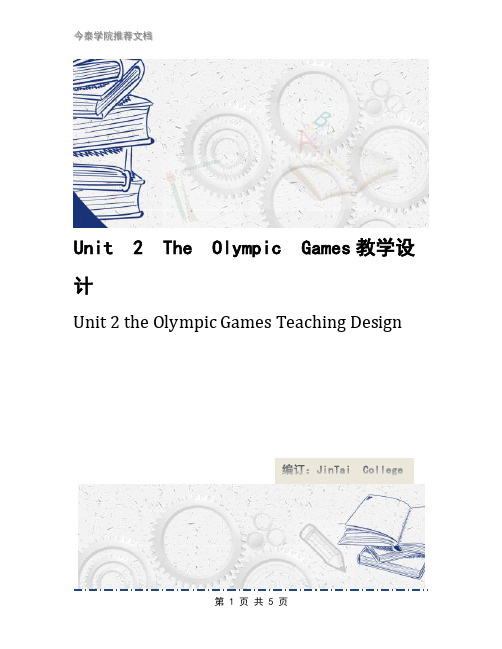
Unit 2 The Olympic Games教学设计Unit 2 the Olympic Games Teaching DesignUnit 2 The Olympic Games教学设计前言:小泰温馨提醒,英语作为在许多国际组织或者会议上都是必需语言,几乎所有学校选择英语作为其主要或唯一的外语必修课。
英语教学涉及多种专业理论知识,包括语言学、第二语言习得、词汇学、句法学、文体学、语料库理论、认知心理学等内容。
本教案根据英语课程标准的要求和针对教学对象是高中生群体的特点,将教学诸要素有序安排,确定合适的教学方案的设想和计划、并以启迪发展学生智力为根本目的。
便于学习和使用,本文下载后内容可随意修改调整及打印。
unit 2 the olympic gameswarming up, pre-reading and readingteaching aims:to learn an interview about the olympic gamesproceduresstep i. warming upwarming upmorning, everyone! did you enjoy yourselves on sunday? today we are going to learn about the olympic games. first, i’d like to know how much you know about the modern olympics. anything about it is ok. oh, whowant a try?…right. you know so much about the olympics. today, we’ll learn mo re about it in ancient greece.finish the form on page 9.step ii. pre-reading1.askingnow, please read the three questions before the reading. let’s do it in turn. let’s begin from thefirst row here…ok, you did a good job. let’s summarize your answers.2.talkingwe know there are many differences and similarities about the ancient and modern olympics. do you know anything about them? you can simply guess. yes, gaoming, try it please …step iii. reading1.reading aloud and finding the general ideanow please listen and read aloud to the recording of the text an interview and pay attention to the pronunciation and intonation. then try to get the general idea of the passage. have you got the main idea?yes, it tells us the differences and thesimilarities between the ancient and modern olympics.2.scanningnow read the text again. you shall try to finish the task: what was the ancient olympics like? what is the modern olympics like?3.careful readingok, now let’s read it silently. first let’s fin d the main sentences of each paragraph and talk about the similarities and the differences between the ancient and modern olympics. who can answer? any volunteers?the similarities①both are held every four years.②both are held not for money but for honour.③the beliefs are the same. they are: swifter, higher, and stronger.④men are allowed to take part both in ancient and modern olympics.⑤some events are the same, such as running, jumping, shooting and throwing.the differences①there were not winter olympics in the past.②now competitors are from all over the world. but in the ancient time, only the people in greece could take part.③only men were allowed to take part in the past, now woman are also allowed.④in the past, winners got the olive wreath as the prize. now competitors compete for medals.⑤the events and athletes in modern time are more than those in the past.there is a special village for the competitors to live in, a stadium for competitions, a gymnasium for these who watch the games now. but there were not in the past.)stepⅳ practisedo the comprehending exercises 1 & 2.step v summarizingdo the summarizing exercises on english weeklystep vi homeworkdo exercises on the workbook-------- Designed By JinTai College ---------。
Unit 2 The Olympic Games精品教案 reading
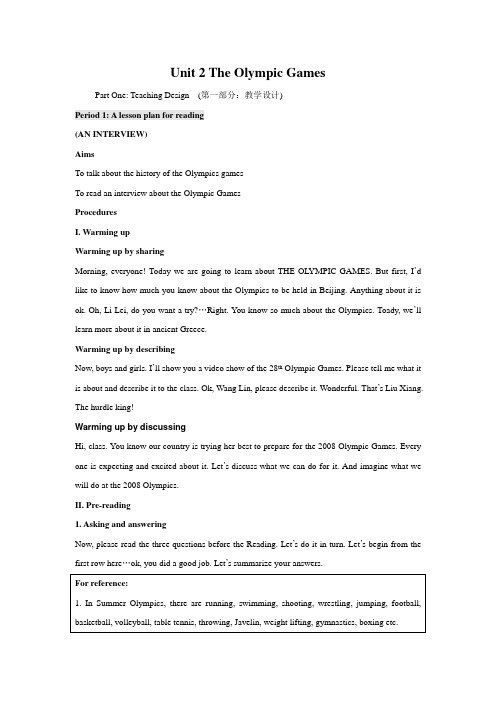
Unit 2 The Olympic GamesPart One: Teaching Design (第一部分:教学设计)Period 1: A lesson plan for reading(AN INTERVIEW)AimsTo talk about the history of the Olympics gamesTo read an interview about the Olympic GamesProceduresI. Warming upWarming up by sharingMorning, everyone! Today we are going to learn about THE OL YMPIC GAMES. But first, I’d like to know how much you know about the Olympics to be held in Beijing. Anything about it is ok. Oh, Li Lei, do you want a try?…Right. You know so much about the Olympics. Toady, we’ll learn more about it in ancient Greece.Warming up by describingNow, boys and girls. I’ll show you a video show of the 28th Olympic Games. Please tell me what it is about and describe it to the class. Ok, Wang Lin, please describe it. Wonderful. That’s Liu Xiang. The hurdle king!Warming up by discussingHi, class. You know our country is trying her best to prepare for the 2008 Olympic Games. Every one is expecting and excited about it. Let’s discuss what we can do for it. And imagine what we will do at the 2008 Olympics.II. Pre-reading1. Asking and answeringNow, please read the three questions before the Reading. Let’s do it in turn. Let’s begin from the first row here…ok, you did a good job. Let’s summarize your answers.2. Imaging and introducingPlease look at the three pictures in the reading. Please talk about them. Imagine whatever you can.3. Talking and SharingWe know there are many differences and similarities about the ancient and modern Olympics. Do you know anything about them? You can simply guess. Yes, Lucy, try …III. Reading1. Reading aloud to the recording and finding the general ideaNow please listen and read aloud to the recording of the text AN INTERVIEW. Pay attention to the pronunciation and intonation as well as the pauses within each sentence. Then try to get the general idea of the passage. Have you got the main idea?Yes, it tells us the differences and the similarities between the ancient and modern Olympics.2. Reading and actingNow let’s play the parts of the Greek writer Pausanias and the Chinese girl Li Li. Now boys, youare Pausanias; girls, you are Li Li. Please pay attention to the bold words.3. Reading and findingNow read the text again. The boys shall try to finish the task: What was the ancient Olympics like? The girls shall try to finish the task: What is the modern Olympics like?4. Reading and collecting informationOk, now let’s read it silently. First let’s talk about the same points between the ancient and modern Olympics. Who can answer? Any volunteers?Then let’s come to the differences.5. Reading and underliningNext you are to read and underline all the useful expressions or collocations in the passage. Copy them to your notebook after class as homework.ⅣClosing downClosing down by doing exerciseTo end the lesson you are to do the comprehending exercises 1 & 2.Closing down by discussingYou know our government has tried its best to compete for hosting the 29th Olympic Games. It has cost a lot of money. Do you think it is worthwhile? Why?Closing by imaginingImagine what we will do and what we can do for the 29th Olympic Games now.Closing down by narratingWe can see the text is written in a conversational style. And there are two speakers. One is Pausanias, a Greek writer 2000 years ago, the other is Li Li, a Chinese girl. Now let’s change it into a narrative style. In other words, let’s describe the ancient and modern Olympic Games in our own words. Who would like to have a try?Closing down by summarizingAs we have finished the passage we’ll sum up what we have learned. First let’s see the writing skills. It is written in a conversational style. It’s in a very interesting way. It adopts a dialogue between Pausanias who lived 2000 years ago and a Chinese gird in modern world. Through their dialogue, the differences and similarities between the ancient and modern Olympic Games are made known to the readers. Just because it is in a conversational style, there are quite a few oral spoken English and elliptical phrases.Through the comparison between the ancient and modern Olympic Games, we have learned the differences and the similarities between them. Now we can have a deep understanding of the Games. From the passage, we can have a deep understanding of the Games. From the passage, we can also get to know that the Olympic Games are developing and improving. It’s our duty to make the Olympic Games better and healthier. We know that one of the slogans for 2008 Beijing Olympic Games is Green Olympic Games. It shows that people are paying more and more attention to our environment.。
参赛教案 人教版必修2UNIT2 READING
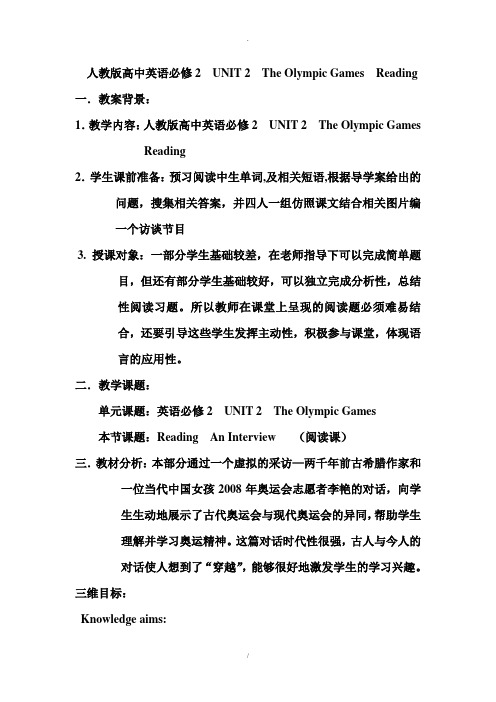
人教版高中英语必修2 UNIT 2 The Olympic Games Reading 一.教案背景:1.教学内容:人教版高中英语必修2 UNIT 2 The Olympic Games Reading2.学生课前准备:预习阅读中生单词,及相关短语,根据导学案给出的问题,搜集相关答案,并四人一组仿照课文结合相关图片编一个访谈节目3. 授课对象:一部分学生基础较差,在老师指导下可以完成简单题目,但还有部分学生基础较好,可以独立完成分析性,总结性阅读习题。
所以教师在课堂上呈现的阅读题必须难易结合,还要引导这些学生发挥主动性,积极参与课堂,体现语言的应用性。
二.教学课题:单元课题:英语必修2 UNIT 2 The Olympic Games本节课题:Reading An Interview (阅读课)三.教材分析:本部分通过一个虚拟的采访—两千年前古希腊作家和一位当代中国女孩2008年奥运会志愿者李艳的对话,向学生生动地展示了古代奥运会与现代奥运会的异同,帮助学生理解并学习奥运精神。
这篇对话时代性很强,古人与今人的对话使人想到了“穿越”,能够很好地激发学生的学习兴趣。
三维目标:Knowledge aims:1.To learn some new words and useful expressions2.To learn something about the Modern and the Ancient Olympics Ability aims:1.To train students’ reading skills2.To train students’ listening and speaking abilityEmotion aims:1.To arouse studen ts’ passion for English2.To arouse students’ passion for China3.To train students’ cooperative spiritTeaching important points1.To understand the reading2.To know the differences and similarities between the Modern andthe Ancient OlympicsTeaching difficult points1.To improve students’ reading ability2.To improve students’ability of showing themselvesTeaching methods1.Group work2.Individual work3.ExplanationTeaching aids1.blackboard2.multi-mediaTeaching steps:Step 1 Lead-inShow the students a short video about the opening ceremony of the 2008 Olympic Games in Beijing to attract students’ attention for this lesson.. The teacher can explain the video in English and Chinese. Then show students pictures of Li Yan and Pausanias to lead them to learn the Reading.Step 2 ReadingScanningGuide students to find the main idea of the text in some minutes. The teacher can lead them to complete the following sentence which is the main idea of the text..According to the text, what is the main idea of the dialogue?The main idea is about the (similarities) and (differences) between the(ancient ) and the (modern)Olympic Games.SkimmingGuide students to finish the True or False questions. Show the sentences on the screen, and give them some minutes to decide whether the sentences are right or wrong, then ask some studentsto tell their answers one by one .True or False1. Pausanias lived in modern Greece and used to write about theOlympic Games.2. Li Yan is a competitor for the 2008 Olympic Games.3. Athletes who reach the standard can be admitted as competitorsin the modern Olympic Games4. It is a great responsibility and a great honor to host the OlympicGames.5. There is as much competition among courtiers to host theOlympicsas to win Olympic medals.Listening and skimmingGuide students to listen to the tape then ask students to finish the chart in groups. In this part, the students can tell their answers group by group.Step 3SummaryAsk the students to finish the summary in some minutes,and give them time to check their answers in groups, then guide them to read the passage together.The Olympic Games are the biggest sports meeting in the world. There are 2 main sets of games----the(Summer)and the(Winter)Olympics, and both are (held) every (4 years)on a regular basis. The Winter Olympics are usually (held)2years before the Summer Olympics. Only athletes who have reached the agreed (standard)for their event will be admitted as (competitors). It is a great honor and a great responsibility to (host)the Olympic Games.People have(replaced)the olive wreath with medals, but it’s still about being able to run (faster), jump (higher)and throw (further).Step 4 Activities(1)Show some pictures about the modern and the ancient Olympics on the screen one by one and let students perform their TALK SHOW about these pictures on the stage. The following are the related questions.1. Where did the ancient Olympic Games start?2. How many countries competed in the ancient Olympic Games?3. How many countries competed in theancient Olympic Games?4. When and where did the modern Olympic Games start?5.Whatwas rewarded tothe winners in theancientOlympicGames?6. What is rewarded to the winners in the modern OlympicGames?7. What do the five rings on the Olympic flag stand for?8. What are the three words that show the spirit of the OlympicGames?9.When and where will the next Olympic Games be held?(2) Show a short videoabout the opening ceremony of the 2008 BeijingOlympicsThe teacher cantranslate the English intoChinese. And also can explain the video in English, then in Chinese.This partcan arouse students’passion for China.Step 5 Conclusion and homework1. Role-play. Read the interview as fluently as you can.2. Try to underline the useful expressions in the passage.教后记:本节课一共分五部分,第一部分通过三分钟左右奥运会开幕式视频引入新课,激起学生学习兴趣;第二部分主要设置了难易程度不同的习题训练学生阅读能力,与合作能力,同时让学生对古代奥运会和现代奥运会的异同有一个细致的了解;第三部分是对文章的一个小结,组织学生完成文章,并集体诵读,既让学生对文章有了一个整体感知,又锻炼了学生的语感;第四部分是学生根据相关问题与图片自己编的一个访谈节目,主人公有美国著名脱口秀节目主持人奥普拉,来自古代的帕萨尼亚斯,刘翔,王楠。
- 1、下载文档前请自行甄别文档内容的完整性,平台不提供额外的编辑、内容补充、找答案等附加服务。
- 2、"仅部分预览"的文档,不可在线预览部分如存在完整性等问题,可反馈申请退款(可完整预览的文档不适用该条件!)。
- 3、如文档侵犯您的权益,请联系客服反馈,我们会尽快为您处理(人工客服工作时间:9:00-18:30)。
Unit 2 Reading:The Olympic Games教案设计
作者:胡亭王一珍
来源:《中学生英语·教师版》2016年第10期
I. Learning aims
(1) During this lesson, students will learn some basic knowledge of the ancient and modern Olympic Games.
(2) They will be able to master the new words and sentences in this passage.
II. Teaching aims
(1) Encourage the students to know something about the history of Olympic Games. Compare the ancient and modern ones.
(2) Through reading, the students learn to grasp the detailed information of the text; their reading skills can be improved.
III. Teaching methods
(1) Fast reading to get the general idea of the passage.
(2) Task-based reading, listening, speaking and writing.
(3) Discussion and Pair work.
IV. Teaching media
Blackboard,Multi-media
V. Teaching procedure
Step 1 Lead in
Do you know something important took place on August 8th, 2008 in Beijing of China? It was a great event about sports in the world. So many great players came to attend it. Eventually,China gold medals among all the countries that attended it. All of you have known it, yes or no?
Yes, it was Olympic Games. Do you want to know something more about it? This text will lead you to enter a world about the ancient Olympic Games and modern ones. (PPT 1-5)
(Purpose:通过2008年北京奥运会的一些图片引出话题,吸引学生注意力;导出阅读内容)
【课前预习】Quiz about the Olympic Games (PPT 6-8)
Step 2:自主学习、文章理解以及奥运常识
A. Choose the best answer:
(1) Do you know when the ancient Olympic Games began?
A. In 1806.
B. In 1900.
C. In 776 BC.
(2) What is the motto of the Olympics?
A. Faster, Higher, Stronger
B. Swifter, Longer, Stronger
C. Farther, Higher, softer
B. Remember these new words: compete, Olympic Games, event, motto, host,athlete, stadium, gold medal, horse-riding
(Purpose:通过抢答,检查学生在预习后对课文的理解以及关于奥运会的常识,调动学生参与课堂的主观能动性。
)
Step 3【课内探究】小组内合作探究
【探究一】听录音,完成下列题目。
(PPT 9、10)
Listen to the text and answer the following questions:
(1) Who could attend the ancient Olympics?
(2) What do the five rings on the Olympic flag mean?
(3) When and where did the ancient Olympic Games take place?
(purpose:检查学生听录音时对课文的理解程度)
【探究二】根据课文内容回答问题。
(PPT 10)
Compare the ancient and modern Olympics; try to find their differences and similarities.(板书内容)
The similarities:
① Both are held every .
② The motto is .
The Differences:
① There was only Olympics in the past.
②Now competitors are from . But in the past, only the people could take part.
【探究三】 Summary of the interview (PPT 11)
According the text, write a short summary about the Olympic Games, including the important information about the games, such as when、where、who、the events、the motto and so on.
(Purpose:深入理解课文内容)
【探究四】 Prepare a speech(PPT 12)
As we all know, the winter Olympic Games will be held in China. Everyone in China feels proud of it. A lot of people would like to be volunteers for the games. They want to help our country host the games successfully. At the same time, they want to let foreigners know more about our motherland. Do you want to be one of the volunteers? What will you do? Prepare a speech to tell your classmates about your idea.
(Purpose:谈论学生所熟悉的运动员,了解他们的成功之路,学习他们百折不挠的精神。
)
Step 5 合作探究,展示解疑
Step 6 Homework
(作者单位:湖北省咸宁市通城县第一中学)。
